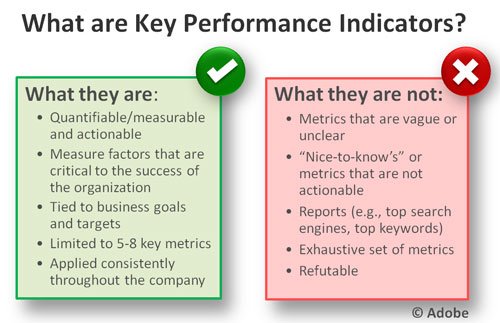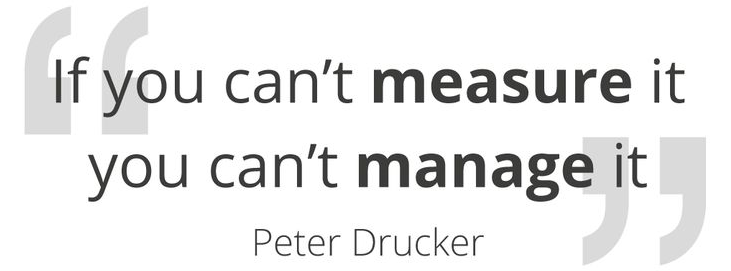What are KPIs and what are they used for?
Each business has its own unique objectives, defined by its specific characteristics such as industry sector, way of operations, contributing staff, etc. A Key Performance Indicator (KPI) is a measure of how the business is performing in terms of its specific objectives. Using KPIs will help you define your goals, outline your plan and monitor your performance.
KPIs are a form of business metrics, essentially the most useful one. Metrics refers to data that demonstrate performance or progress. For example, you can measure how many people visit your website every month, or how many people give a positive feedback versus a negative one on a certain product or service. You can measure how many defective units you get in a given production, or how many of the visitors who enter a store actually buy something. However, not all data are vital. Tracking how many people follow your facebook page is useful, however it might not be a strong indicator of success in your business. Essentially, KPIs are the metrics that are the most helpful in determining your own specific key objectives.
image credit
Why are KPIs important for your business?
Clear targets:
KPIs help you set targets and focus on what's really important for the growth of your business. There are too many metrics out there that can create a lot of distractions and make you lose track of what really matters, what your business can't live without.A detailed business plan:
The very action of setting your KPIs will help you put things into perspective. Since they represent the most important points you need to focus on and since you will need to define each KPI, you will be basically making a detailed business plan with all vital parameters set.Monitor progress:
You will be able to monitor any effects of a change that takes place, or any results of specific actions. You can see what works and what not, and how long it takes for the effects to apply.Detect problems in particular areas:
Since your goals are now compartmentalized, you can find the root of a particular problem and that will help you take targeted actions to solve it, without affecting areas that are functional.Create consensus regarding what's important:
Having the same set of KPI targets offers managers and employees a common insight on what they should consider important and helps define their priorities.
image credit
How to select the appropriate KPIs?
The important thing is to prioritize which metrics are the most useful for your business. Think of them like the vital signs of your business. Just like you wouldn't pay equal attention to a high fever and a torn nail, there are things that require more attention from your part. There are metrics that can be really useful for your company but still not vital. Select the wrong metrics or just too many of them and they can make you lose track of what's really important - as well as give you a misleadingly positive or negative forecast.
These are some initial questions that will help you select the right KPIs, such as "What are my business objectives?", "How can I achieve them?", and "Who will play a key part on achieving them?"
An effective way to evaluate the relevance of a KPI is to use the SMART criteria. It is an acronym that stands for specific, measurable, attainable, relevant, time-bound. In other words:
-Is your objective specific?
-Can you measure progress towards that goal?
-Is the goal realistically attainable?
-How relevant is the goal to your organization?
-What is the time-frame for achieving this goal?
image credit
Asking defining questions:

Based on this method, you can then proceed to define the critical KPIs by asking the following questions:
-What is your desired outcome?
-Why is it important?
-Who can influence it?
-How/where/when can they influence it?
-How will progress be measured?
-How often will you review progress towards the outcome?
The nature of KPIs depend on the specific needs of each business. They can also belong to different sectors of the same business, such as customer service, financial performance, internal processes and employees. Business and analytics consultant Bernard Marr mentions 25 of the most common KPIs.
If you would like to learn more which KPIs you can consider, what they are used for and how they can be calculated, check the free online KPI Library of the Advanced Performance Institute.

It's nice to see some business related posts on my feed! =D
[Parenthesis : It would be cool to put a link on "FOLLOW elemenya" image to go straight to your profile :)]
Thank you! Oh you are right, I forgot the hyperlink :D
Thank you for sharing such a wonderful informative post!
Thank you!
Interested post, followed you @elemeya
Thank you. I followed you back, you have some interesting posts!
welcome @elemeya, you are brilliant
Beautiful piece friend, thanks for coming all business on us, I definitely learned a lot :)
Thank you :)
a question i ask myself each day on defining how KPI short term and long term. perfect article to start a monday. cheers @elemenya
Thank you. I'm glad i helped!
Good information that seems very useful. Thanks!
Thank you!
Helped me a lot @elemenya one of the great posts i've read about business
Thank you, @olivercuico. Glad I helped!
When it comes to indicators, it is important to control, among others, the pcc campaign. This is an important aspect, so I highly recommend this post: https://gamerseo.com/blog/ppc-metrics-how-to-measure-the-performance-of-your-ad/